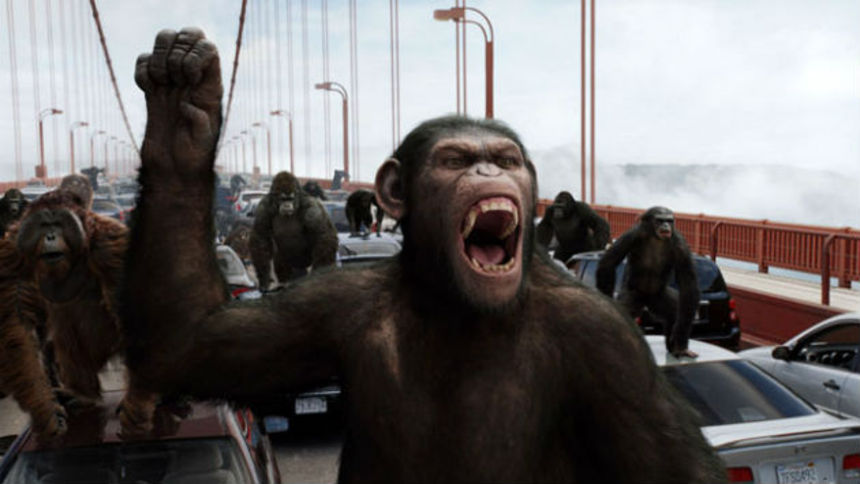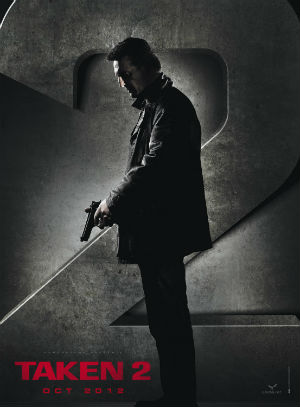Hollywood Beat: Sequels Are Cool! (APES!) Except When They're Not (TAKEN 2)

Matt Reeves has been chosen to direct Dawn of the Planet of the Apes, the next installment in the newly-revived Fox franchise. It's the rare sequel that is anticipated rather than dreaded, mainly because Rise of the Planet of the Apes was much better than anyone expected, a dynamic combination of story, character, and action.
Now, of course, since expectations have been raised so high, we can look forward to being disappointed by Dawn.
How could it be otherwise? No one expected anything from Rise because the previous attempt to resurrect Apes failed miserably. Tim Burton's Planet of the Apes remake followed the storyline of the 1968 original too closely to provide any excitement for hardcore fans, without adding any fresh new elements. Mark Wahlberg nailed the picture to the floor with a wooden performance, making everyone appreciate Charlton Heston just a little bit more. Perhaps even worse, it made casual moviegoers wonder why anyone would ever be silly enough to be 'ape-crazy' for the original series.
Reeves wrote and directed Let Me In, thus proving he could fashion a remake that was faithful to the original. He didn't add very much in his English-language version, but neither did he dumb it down or disrespect the material. So there's every reason to believe he can perform a similar trick with Dawn of the Planet of the Apes, replicating the adventurous spirit created by director Rupert Wyatt.
But replicating is not enough; this is very much a sequel that will depend on the strength of the script. Rick Jaffa and Amanda Silver, who wrote Rise, also wrote the initial drafts for this sequel, with additional work by Scott Burns. Rise drew inspiration from Conquest of the Planet of the Apes, the fourth installment of the original series, and that was a very smart move.
Dawn now has the opportunity to go in a completely new direction than the original series, without an established template to follow, and everything will depend on whether the story extends the previous film's premise in unexpected directions -- or simply retreads what worked before without adding anything to the mix.
 Retreading what worked in the past seems to be the modus operandi for Luc Besson, at least as far as his work as a producer is concerned. (As a director, he is much more willing to take risks.) Besson has been churning out generic action movies for years, often in collaboration with screenwriter Robert Mark Kamen. The stars and titles may change, but the narrative beats remain the same.
Retreading what worked in the past seems to be the modus operandi for Luc Besson, at least as far as his work as a producer is concerned. (As a director, he is much more willing to take risks.) Besson has been churning out generic action movies for years, often in collaboration with screenwriter Robert Mark Kamen. The stars and titles may change, but the narrative beats remain the same.
Indeed, in looking back over Besson's filmography as producer -- 88 credits since 2000! -- it's difficult to remember the differences between, say, Transporter 3 and Taken, which both emerged in 2008. Oh, sure, Jason Statham starred in one and Liam Neeson in the other, but in both the lead characters were taciturn men with 'a certain set of skills' who were more than willing to use those skills to kill, maim, and cause untold property damage in order to protect themselves and/or their loved ones.
There is more than a whiff of the old Hollywood dream machine / factory operating in Europe under Besson's direction. He's built a tight, efficient operation that can make stylish action flicks that travel well and are, presumably, consistently profitable. A closer study reveals that, yes, the films are different, chiefly because some of the directors involved are able to assert their individuality and assemble action sequences that are more cohesive than others.
Tim Adler rounded things up nicely in an article for Deadline last year, giving credit to Besson for his role in revitalizing the commercial side of the industry. "Luc Besson did things like a French version of Roger Corman," said director Louis Leterrier, who directed the first two installments of the Transporter series before moving onto The Incredible Hulk and Clash of the Titans. "When I started at EuropaCorp, I was making Luc his tea. He really respects passion, and he could see the passion in me. Luc has tried to re-inject the industry as much as he can, and extend the reach of French cinema."
Frankly, though, Besson more closely resembles the Roger Corman of the 1980s, when he became more and more conscious of keeping costs down as the studios hijacked genre pictures and inflated them with huge budgets and state-of-the-art special effects. Corman continued making pictures at a profit, but relatively few of the directors who worked under him during that period transitioned into making films of merit.
Besson will continue making anonymous action pictures -- and U.S. studios will continue to distribute and promote them -- as long as the market supports them, and making sequels to those that do really well, but I can't imagine anyone getting excited about them. And between Taken 4 and Planet of the Apes 17, I'll take the risk of apes disappointing me vs. the predictability of a kidnap thriller every time.
"Hollywood Beat" is a weekly column on the U.S. film and TV industry.







